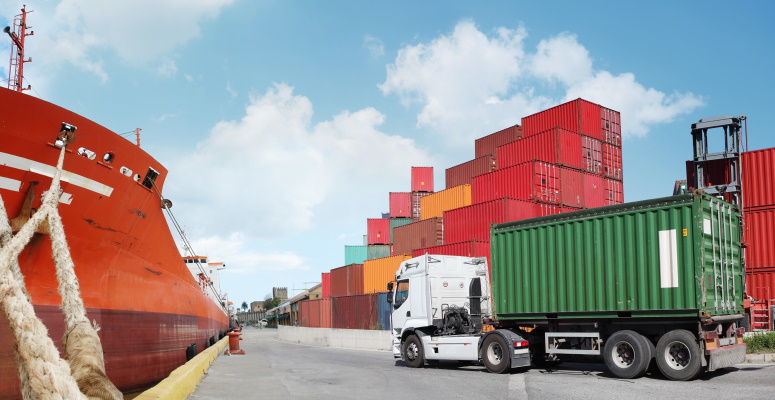
Month in Review – December 2023
Maritime
December 1: Five Carrier CEOs Call for Regulatory Partnership and End to Fossil Fuel Ships – The Maritime Executive
The CEOs of five of the world’s largest shipping companies took the unusual step of joining together to outline a shared vision to accelerate the decarbonization of the global maritime industry. Timed to the conclusion of the UN’s COP 28 conference in Dubai, the executives of CMA CGM, Maersk, MSC, Hapag and Wallenius Wilhelmsen called for cooperation, including an alliance with the International Maritime Organization, and the definitive regulatory measures needed to create the investment conditions critical to accelerating the industry’s green transition.
As four of the largest container shipping companies, along with the leader in vehicle logistics, each of the companies highlights that they have taken steps to drive the transition. They are investing in efforts within their fleets and reiterating their belief that the importance of shipping achieving the IMO’s greenhouse gas targets is very clear.
December 1: Quebec City Longshoremen Reject Mediator’s Recommendation to End Lockout – CUPE press release (translated from French)
At a meeting on December 1, longshoremen at the Port of Quebec voted 70% against the proposal from a mediator. With the holidays approaching and the possibility of a second Christmas on the picket lines, the members rejected the offer as insufficient.
“It’s a … message to the employer that, after 15 months of lockout, there can be no half-deal. The parties need to get back to the bargaining table and find common ground that satisfies both parties,” said Nina Laflamme, CUPE union representative.
The longshoremen have been locked out since September 15, 2022. To carry out the work at the port, the employer uses replacement workers.
December 7: Strike Across Flemish Waterways Disrupts Antwerp Port Operations – The Loadstar
Strikes across Flemish waterways have hit operations at Antwerp – the second biggest container port in Europe.
Action by marine pilots and public service workers, which has spread across Flanders, Belgium, has resulted in lock closures and congestion, as unions VSOA and ACOD respond to reforms to the Flemish civil service statute.
The Port of Antwerp said the industrial action started on December 4, and it was “very hard to predict” how long it would last.
Inchcape Shipping Services (ISS) said on December 7 there were 49 ships waiting for arrival or departure at Antwerp, and raised concern that knock-on effects to wider supply chains could be expected if the strikes continued.
December 7: More Liner Services Avoiding Canals to Head for the Cape – The Loadstar
Confidence in the Panama Canal to process container vessel transits appears to have completely bombed over the past week.
“Multiple carriers have revealed changes to imminent voyages by removing the Panama Canal, signalling a continued loss of confidence in the passage in the weeks to come,” said eeSea operations and forecasting analyst Destine Ozuygur.
However, expectations that this might result in an increase in vessels transiting the Suez Canal have been dented by the recent attacks on commercial shipping by Houthi rebels, off the coast of Yemen.
“It seems many vessels that had originally planned to utilize a divergent route through the Suez Canal are now avoiding the area for fear of the safety of their crew and the vessels,” Ozuygur said. “For the first time in recent memory, we could possibly see a significant downturn of traffic through the Suez and the Panama canals, with a high volume of vessels preferring passage past the Cape of Good Hope.”
December 7: Container Shipping Outlook 2024: Rising Risk of Delays, Disruptions – American Shipper
The supply chain crisis is long over, but America’s importers still have a lot to keep them up at night as they plan for 2024.
Two key container shipping “chokepoints” – the Panama Canal and the Bab-el-Mandeb Strait in the Red Sea – are simultaneously under threat. Container-line financials are under severe pressure, forcing ever more vessel sailings to be canceled. The dockworkers union serving East and Gulf Coast ports is threatening to strike next October. While freight rates are low, concerns over delays in import shipments are high.
For an overview of the disruption risks in the year ahead, and advice on how U.S. importers can mitigate those threats, read this interview with Nerijus Poskus, global head of ocean procurement for Flexport.
December 15: Maersk and Hapag Pause Red Sea Runs as Industry Calls for Immediate Action – The Maritime Executive
Shipping giants Maersk and Hapag-Lloyd both confirmed on December 15 that they have paused all planned transits of the Red Sea and the Bab al-Mandab Strait, while the shipping industry is calling for immediate actions and a stop to the “flagrant breach of international law” that is risking the lives of seafarers and global trade. The actions came after the recent escalation, which saw a missile land close to a Maersk containership on December 14, a confirmed strike on a Hapag vessel on the 15th, and two MSC containerships targeted by the Houthi with one possibly struck.
December 15: Panama Canal Reverses Cuts in Daily Transits and Adjusts Reservations – The Maritime Executive
The Panama Canal Authority is delaying some of the scheduled reductions in daily transits that it was planning to implement starting next month due to slight improvements in the reservoir’s water levels and, at the same time, further adjusting its system for reservations. The changes come as good news for the shipping industry, which is increasingly diverting vessels as the conflict in the Red Sea threatens to choke off a critical alternate route.
The announced changes will restore two slots that had been removed from the daily transits for a total starting in January 2024 of 24 daily transits. The Panama Canal is currently restricted to 22 transits split with six at the Neopanamax locks and 16 at the Panamax locks. The plan called for the number of slots to be lowered to 20 in January and further reduced to 18 in February. The Panama Canal Authority highlights that today’s announcement allows for an increase of six daily slots above the projected low that was scheduled to take effect in about six weeks. It adds 30 percent from the previously announced daily low starting in February.
November’s rainfall was less adverse than projected by the forecasters plus the Panama Canal Authority highlights the positive outcomes of its water-saving measures. They implemented steps ranging from water recycling to short locking to decrease the amount of water lost from each transit.
December 17: OOCL Stops Serving Israel Because of ‘Operational Issues’ – The Maritime Executive
Chinese container carrier OOCL has decided to suspend all shipments to and from Israeli seaports, the company announced on December 16.
“Due to operational issues, OOCL will stop cargo acceptance to and from Israel with immediate effect until further notice,” the firm said in a one-sentence statement on its website.
At least four container lines have abandoned shipping through the Red Sea and the Suez Canal because of the ongoing threat of attack from Houthi forces in northern Yemen. MSC, CMA CGM, Maersk and Hapag-Lloyd have all signaled that they will take the Cape of Good Hope route, avoiding the risk of missile strikes, drone attacks or hijackings near Bab el-Mandeb.
The Houthi movement has threatened to attack any ship carrying cargo to Israel, and the militant group has the full width of the Red Sea in range off Hodeidah. By stopping service to Israel, OOCL appears to satisfy the Houthis’ political conditions for safe passage.
December 19: U.S. Announces Naval Coalition to Defend Red Sea Shipping from Houthi Attacks – The Guardian
The U.S. has announced the creation of an enhanced naval protection force operating in the southern Red Sea in an attempt to ward off mounting attacks from Yemen’s rebel Houthis on merchant shipping.
Britain said it would be among the countries participating, but notable absentees were Arab nations Egypt and Saudi Arabia. Analysts speculated that shipping would continue to be disrupted and attacks continue.
Lloyd Austin, the U.S. defence secretary, said the new effort would be called Operation Prosperity Guardian and was necessary to tackle the “recent escalation in reckless Houthi attacks originating from Yemen.”
Other participants in the effort, Austin said, included Bahrain, Canada, France, Italy, the Netherlands, Norway, Seychelles and Spain.
December 19: Brace for Increased Shipping Rates as Lines Avoid Red Sea – Inside Logistics
Four of the top five largest container carriers will be avoiding the Red Sea and the Suez Canal until security is restored to the waterway. Together with ZIM, who was already diverting its Red Sea traffic, these carriers represent 56 percent of global capacity, meaning an estimated 17 percent of global volumes will be taking a longer, more expensive route from Asia around the southern coast of Africa.
Container diversions will take an extra seven to 14 days in transit time depending on the lane, and mean a 15 to 20 percent increase in costs for carriers. In addition to longer voyages and higher costs, disruptions to scheduled arrival times could cause congestion at destination ports and some equipment shortages, as empty containers take longer to get back to origin ports.
December 19: Houthi Leaders Vow to Keep Up Attacks on Shipping – The Maritime Executive
After a month of missile and drone attacks by Yemen’s Houthi rebel group, the United States has convened a group of 10 partner nations to assist in restoring maritime security in the Red Sea – but industry players, defence experts and Houthi leaders question whether it will have the desired effect.
“The American-formed coalition is to protect Israel and militarize the sea without any justification, and will not stop Yemen from continuing its legitimate operations in support of Gaza,” said Houthi spokesman Mohammed Abdel-Salam in a statement. “Whoever seeks to expand the conflict must bear the consequences of his actions.”
December 20: Carriers ‘Tear Up Schedules’ in Race to Get Diverted Box Ships to Port – The Loadstar
European and U.S. container ports and forwarders are scrambling to obtain revised ETAs for vessels from Asia that have been rerouted around the Cape of Good Hope.
Meanwhile, there is speculation that ships heading for North Europe may be instructed to increase speed to grab terminal slots ahead of their competitors.
At an average service speed of 18 knots, diverting around Southern Africa will add around 10 days to voyage times to North Europe and could add 15 days to transits to eastern Mediterranean ports. Asia-U.S. east coast services will see voyages extended by approximately seven days.
December 22: Carriers Are ‘Price Gouging,’ Claim Shippers as FAK Rates Skyrocket – The Loadstar
Shippers are accusing Asia-North Europe ocean carriers of ‘price gouging’ as FAK (freight all kinds) rates being quoted for January shipment go through the roof.
The Loadstar has been inundated with messages from shipper contacts who just cannot believe the level of rates being quoted by carriers.
“We expected our rates to be increased next year, but not to this level, and apparently they are non-negotiable,” said one UK-based NVOCC.
“This has cemented their $3,000 January GRIs and more,” said a forwarder contact.
And a shipper contact, importing bulk commodities into the UK from China, said carriers were refusing to accept his heavy boxes, although he said one line had quoted him $3,000 for each 20ft.
“I was only paying $435 per 20ft a month ago,” he said, “I have no hair left!”
December 26: Red Sea Drone and Missile Attacks Continue Undeterred Despite Coalition – The Maritime Executive
Attacks on commercial shipping coming from Yemen continued on December 26, apparently undeterred by the multinational coalition led by the United States. While no vessels reported being hit, the Houthi rebels reiterated that they are targeting Israeli shipping interests and ships trading with Israel.
U.S. Central Command reported that U.S. forces shot down 12 one-way attack drones, three anti-ship ballistic missiles and two land attack cruise missiles over a 10-hour period on December 26.
The U.S. Pentagon asserted that more than 100 drones and missiles have been launched against commercial ships from 35 nations.
Air
December 14: Shippers and Forwarders Expected to Target Longer-Term Deals in 2024 – Air Cargo News
Shippers and forwarders are returning to longer-term and fixed-capacity agreements as the air cargo market continues to normalize.
In a recent market update, Flexport vice president and global head of airfreight Zeid Houssami said that this switch to longer fixed-capacity contracts was partly driven by the rise of e-commerce demand, with some companies looking to secure predictability in terms of cost and speed.
The switch is also driven by improving shipper confidence that next year’s market will be more predictable and consistent as supply and demand is more balanced.
December 19: New Calgary Airport Property Owner Shifts Focus to Air Cargo – American Shipper
A jungle gym, indoor go-kart track and other mismatched businesses will eventually be moved out of a logistics complex at Calgary International Airport to make way for cargo operators that can utilize the airside access for its intended purpose – moving commerce – according to the property’s new owner.
Realterm, a global investment manager focused on logistics infrastructure and a developer of cargo real estate at airports, last week announced it had acquired control of more than 502,000 square feet of industrial property adjacent to the Calgary airfield.
Three of the five buildings in the logistics centre sit along the tarmac and have the capability to host freighter aircraft. In the 13 to 15 years since they were built, none of the facilities have had dedicated air cargo tenants, said Alexi Lachambre, Realterm’s vice president of investments.
December 20: Exporters Explore Air Freight Options as Red Sea Chaos Deepens – Yahoo Finance
Exporters are scrambling to find ways to get key consumer goods to buyers, including by air, as a wave of attacks in the Red Sea adds to ocean freight supply chain problems.
Companies are now trying to switch to intermodal transport to maintain global supply chains, which involves a combined sea and air route, said Jan Kleine-Lasthues, Chief Operating Officer, Airfreight with German freight forwarder Hellmann Worldwide Logistics.
That means goods being transported first by sea to a port in Dubai, from where they are moved by air freight, he said.
“This alternative route allows customers to avoid the danger zone in the Red Sea and the long voyage around the southern tip of Africa,” Kleine-Lasthues told Reuters.
December 28: Airfreight Rates Bounce Back to 50% Above Pre-COVID Levels – Air Cargo Week
Preliminary figures for week 50 (December 11 to 17) indicate that global tonnages and average worldwide rates were stable compared with the previous week, after recovering more quickly than last year from the seasonal post-Thanksgiving dip last month, based on the more than 400,000 weekly transactions covered by WorldACD’s data.
Comparing weeks 49 and 50 this year with the preceding two weeks (2Wo2W), overall tonnages increased 1%, and overall global average rates continued to rise, by 2%, with capacity up 1%. The figures indicate that demand and pricing are levelling off, as they usually do in the second half of December, after rallying in the last three months.
Although the main driver for the recent increases has been a surge in tonnages and rates ex-Asia Pacific, especially China, volumes ex-Asia Pacific have now flattened, although there have still been some modest rises in average rates ex-Asia Pacific, especially to North America (+4%), on a 2Wo2W basis.
Rail
December 7: CN to Acquire Iowa Northern Railway – Progressive Railroading
CN has signed and closed an agreement to acquire Iowa Northern Railway (IANR), which operates 275 track miles in Iowa connecting to CN’s U.S. rail network.
The transaction closed into an independent voting trust pending regulatory review of the transaction by the Surface Transportation Board (STB), CN officials said in a press release. An STB decision on the acquisition is expected in 2024, according to CN.
IANR serves upper Midwest agricultural and industrial markets covering many goods, including biofuels and grain. The transaction creates single-line service to North American destinations, while preserving access to existing carrier options, CN officials said.
Trucking
December 1: Truck Drivers Want More Training, MELT Falling Short: Survey – Today’s Trucking
Surveyed Canadian truckers want future truck drivers to undergo substantially more training than they did themselves, with almost half expressing concerns about mandatory entry-level training (MELT) requirements.
Fifty-one percent of those who responded to a survey said mandatory entry-level training has failed to improve the quality of entry-level truck drivers.
Twenty-six percent said students should complete up to 125 hours of formal training before being licensed to drive, while 12% set the benchmark at 125-149 hours, 29% at 150-299 hours, 18% at 300-599 hours, and 15% at 600 hours or more.
In contrast, 59% of those who were surveyed received less than 100 hours of formal training before being licensed themselves.
December 15: Teamsters, B.C. Container Commissioner Square Off – Today’s Trucking
The Office of B.C. Container Trucking Commissioner (OBCCTC) and unionized trucking companies in Greater Vancouver are in heated debates over a new policy that applies port rates to off-dock trucking.
OBCCTC believes this is the way to achieve stability and equal driver pay in the Lower Mainland.
But the Teamsters, who represent both licensed and unlicensed companies, say that enforcing regulated port rates for non-port work exceeds OBCCTC’s jurisdiction, causing financial issues for licensed trucking companies and putting unionized jobs and business stability at risk. According to a recent Teamsters press release, unlicensed trucking companies that are not paying port rates ‘can swoop in and undercut the unionized competition.’
December 15: B.C. Pilots Vehicle-to-Grid Bidirectional Charging – Today’s Trucking
Lion Electric is one of several companies that are participating in a B.C. pilot project aimed at providing the feasibility of vehicle-to-grid (V2G) technology, in which electric vehicles not only draw from, but also return unused electricity to the grid.
The project is led by Coast to Coast Experiences (CTCE), which says this is Canada’s first vehicle-to-grid pilot project for medium- and heavy-duty vehicles.
Fleet owners will be able to monetize their electric vehicles by selling power back to the utility using V2G technology.
CIFFA Advocacy, Communications, Activities
December 7: CIFFA to Appear Before House of Commons’ Standing Committee on International Trade
CIFFA was asked by the House of Commons’ Standing Committee on International Trade to appear on December 7 as part of a panel of witnesses in view of its study The 2023 strike at the Port of Vancouver: Selected Impacts, Responses and Port-related Innovation. CIFFA’s Executive Director Bruce Rodgers and Director, Policy and Regulatory Affairs Julia Kuzeljevich appeared before the committee.
December 19: CIFFA Signs MOU with Pledge Earth Technologies
CIFFA recently signed a memorandum of understanding with Pledge Earth Technologies Ltd., a carbon-emissions measurement and offsetting platform.
This new partnership will provide research documents for member benefit, as well as informational webinars to educate members in the new year.
Pledge offers software solutions to empower logistics service providers to support their clients in meeting their sustainability goals. It provides accessibility and transparency to freight emissions measurement, reporting and offsetting, allowing businesses to offer these services without increasing operational costs. To learn more, visit www.pledge.io.



